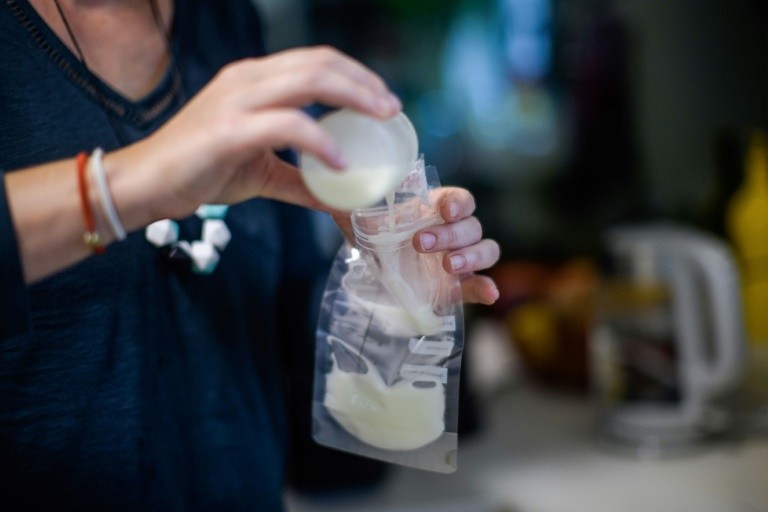Whisked out of her Hong Kong home by medics in protective gear, Catherine Kosasih didn’t know if or when she would see her children — aged just four months and 21 months — again.
Once in hospital, her COVID-19 diagnosis was confirmed, she was kept in isolation and her husband and children quarantined. Worse still, they discovered that because her youngest was allergic to formula, there was no way to feed her.
“I left the house suddenly and I didn’t know how long I would be in the hospital. I had so many worries but one of the biggest ones was for the baby, who is breastfed, especially after she had such a bad reaction to formula that my husband was close to calling an ambulance,” explains the 33-year-old.
After doctors told Kosasih to dump her pumped milk because the medication she was taking to treat the virus could be passed to her baby, she contacted Gemma MacFarlane founder of Hong Kong Breastfeeding, a social media support group.
MacFarlane posted an SOS call for donations online.
Within hours, scores of mothers had come together to offer what they could, and within a day more than 15 litres — enough to feed the baby for around two weeks — had been pledged.
“I was in tears, I still can’t believe so many mums pumped milk for my baby,” says Kosasih, who suffered fever, fatigue, muscle pain, and had white spots on her lungs.
She spent two weeks in hospital battling the virus that has killed more than 200,000 people worldwide since it was first identified in China in December.
– Race against time –
Novel coronavirus has so far not been found in breast milk and the World Health Organization says mothers who have COVID-19 and wish to breastfeed should be supported to do so safely.
But Hong Kong has some of the strictest isolation rules for virus patients.
MacFarlane felt compelled to help: “It’s bad enough that she’s been separated from her baby but to think that she’s had to waste her liquid gold is horrible, then top that off with her baby having a terrible reaction to the artificial breast milk substitute. You’d be heartless not to care.”
For many parents, the fear of their children facing quarantine or hospitalisation alone, or being separated from them, is far more of a concern than contracting the virus itself.
Kosasih’s plight — and that of her husband Juergen Ditz who was left caring for two infants in quarantine — struck a chord with many who donated breast milk.
“During these dark times, we need to show compassion and empathy,” says mother-of-one Nicole Bautista, who pumped extra milk for this drive.
“If I were in the same situation, I would have been extremely upset,” she adds.
There were still logistical challenges to overcome.
But it was a race against time to get the milk — usually stored frozen — from multiple meeting points to Ditz, 41, and their daughters Kalea and Avielle before it thawed.
The volunteers who run Hong Kong Breastfeeding effectively formed a breast milk supply relay.
– Panic buying, hungry babies –
After MacFarlane’s callout and as the offers flooded in, Gillian Coull took over collation and collection, enlisting partner David Barnaby as motorbike courier to zoom around the city getting the milk.
He handed over the boxes to Nissa Cornish and others, who delivered it to the drop site by the family’s home in a remote part of Hong Kong.
“It was genuinely humbling how ready and willing mums were to share their precious breast milk stash with a total stranger. Some mums contributed upwards of two litres each,” recalls Coull.
Ditz says he tried to keep some normality for the children by connecting with his wife on FaceTime to wake them up and to eat together.
But with no viable milk, he feared the baby too would end up in hospital — until he saw the huge donation on his doorstep.
“I was in tears. I couldn’t believe it. I didn’t realise that much community spirit existed in Hong Kong, which is usually so money, money, money.”
The spread of the virus is fostering similar milk drives — originating online but with real-world results — globally. Donating breast milk is legal but unregulated in most countries.
In the UK, similar informal efforts are taking place around the country.
American writer and influencer Jenny Tamas, who has millions of followers across social media, launched a nationwide milk drive via Instagram after hearing of mothers left distraught and unable to feed their babies because panic buying had left formula shelves empty.
Tamas’ project enabled mothers needing breast milk from each state to match up with donors.
“It gives immediate power to moms with hungry babies that feel as though they haven’t any. And when you have a baby who is hungry and you have no other options, you don’t have time to wait.”
AFP

